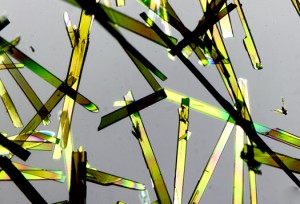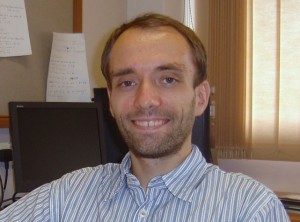They say that those ‘perfect’ diamonds are forever.
‘Flawless’ snowflakes are endlessly changing. And a pinch of table salt can turn your dreary sandwich into an ideal snack. But crystals are imperfect. Ask Dr. Alexander Shapeev from the UNiversity of Minnesota who devotes his research to computing minuscule faults in grand crystals.
Monday, May 5, 2014 13.30 – 15.00
Beijing-1 Auditorium, China cluster
Skolkovo School of Management
Title: «COMPUTATIONAL METHODS FOR CRYSTALLINE DEFECTS: CONSTRUCTION, ANALYSIS, AND BENCHMARKING»
SEMINAR ABSTRACT: Defects, defined as irregularities in the periodic arrangement of atoms, determine various important properties of crystalline materials. Such crucial features are plasticity or failure.
Computing defects such as dislocations or cracks is often challenging, because the spatial and temporal scales accessible for direct molecular simulations are limited. Dr. Shapeev’s talk will be devoted to efficient methods for computing crystalline defects. He will focus on atomistic-to-continuum (AtC) coupling, a popular approach utilizing atomistic resolution near the defect core while using the continuum model to resolve the elastic far-field.

Nobody is perfect. Not even crystals
In his talk Dr. Alexander Shapeev will
- Give a brief introduction to crystalline defects and AtC coupling.
- Report one of the recent developments in construction of a consistent energy-based AtC coupling method.
- Present a mathematical theory of how to optimize and compare the performance of existing methods.
The first part of the talk will be devoted to his past research on computing static properties of defects, such as atomistic configuration or formation energy. In the second part, Alexander will speak about the present research and future plans on dynamics of defects and finite temperature.
SPEAKER INTRODUCTION:

Dr. Alexander Shapeev
Alexander Shapeev is a postdoctoral associate in the Department of Mathematics in the University of Minnesota. He obtained his bachelor’s and master’s degree from the Novosibirsk State University and his PhD degree in mathematics from the National University of Singapore.
His research interests lie in applying computational mathematics to materials science and related fields. His current research is devoted to developing a mathematical theory and new computational methods for materials defects (such as dislocations or cracks). Alexander is an author of 11 peer-reviewed papers, one of which has been awarded the 2013 SIAM Outstanding Paper Prize.
* The Skolkovo Institute of Science and Technology (Skoltech) is a private graduate research university in Skolkovo, Russia, a suburb of Moscow. Established in 2011 in collaboration with MIT, Skoltech educates global leaders in innovation, advance scientific knowledge, and foster new technologies to address critical issues facing Russia and the world. Applying international research and educational models, the university integrates the best Russian scientific traditions with twenty-first century entrepreneurship and innovation.
